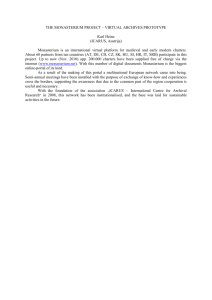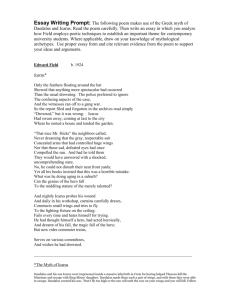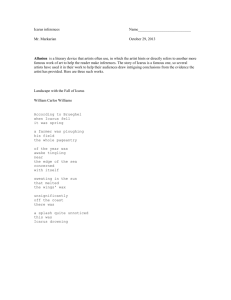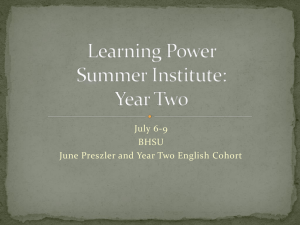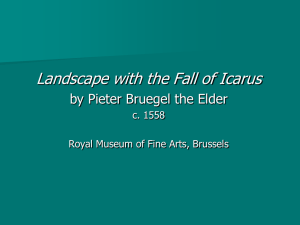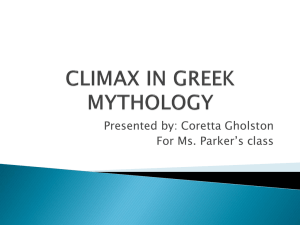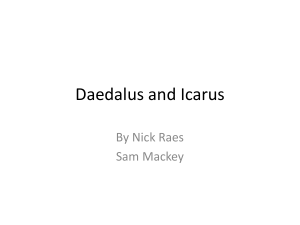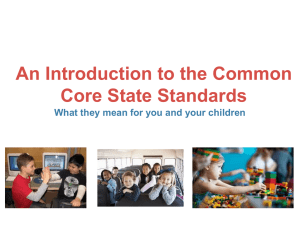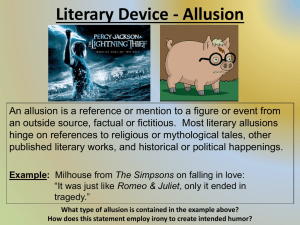2006 Interim Report to the Ittleson Foundation on The
advertisement
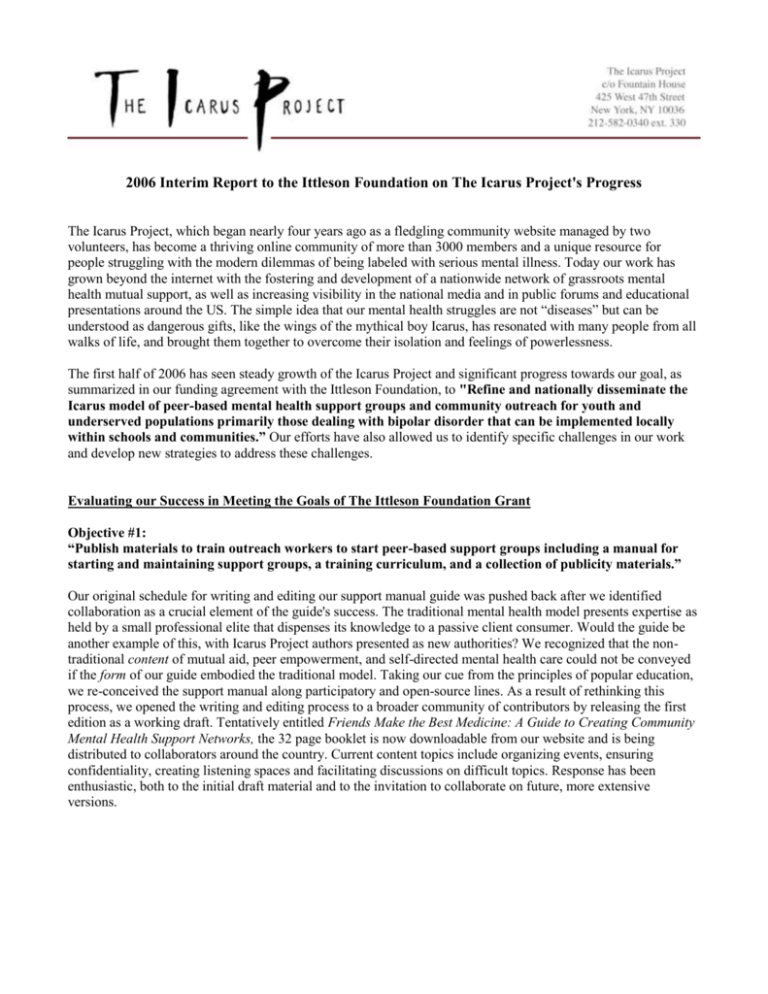
2006 Interim Report to the Ittleson Foundation on The Icarus Project's Progress The Icarus Project, which began nearly four years ago as a fledgling community website managed by two volunteers, has become a thriving online community of more than 3000 members and a unique resource for people struggling with the modern dilemmas of being labeled with serious mental illness. Today our work has grown beyond the internet with the fostering and development of a nationwide network of grassroots mental health mutual support, as well as increasing visibility in the national media and in public forums and educational presentations around the US. The simple idea that our mental health struggles are not “diseases” but can be understood as dangerous gifts, like the wings of the mythical boy Icarus, has resonated with many people from all walks of life, and brought them together to overcome their isolation and feelings of powerlessness. The first half of 2006 has seen steady growth of the Icarus Project and significant progress towards our goal, as summarized in our funding agreement with the Ittleson Foundation, to "Refine and nationally disseminate the Icarus model of peer-based mental health support groups and community outreach for youth and underserved populations primarily those dealing with bipolar disorder that can be implemented locally within schools and communities.” Our efforts have also allowed us to identify specific challenges in our work and develop new strategies to address these challenges. Evaluating our Success in Meeting the Goals of The Ittleson Foundation Grant Objective #1: “Publish materials to train outreach workers to start peer-based support groups including a manual for starting and maintaining support groups, a training curriculum, and a collection of publicity materials.” Our original schedule for writing and editing our support manual guide was pushed back after we identified collaboration as a crucial element of the guide's success. The traditional mental health model presents expertise as held by a small professional elite that dispenses its knowledge to a passive client consumer. Would the guide be another example of this, with Icarus Project authors presented as new authorities? We recognized that the nontraditional content of mutual aid, peer empowerment, and self-directed mental health care could not be conveyed if the form of our guide embodied the traditional model. Taking our cue from the principles of popular education, we re-conceived the support manual along participatory and open-source lines. As a result of rethinking this process, we opened the writing and editing process to a broader community of contributors by releasing the first edition as a working draft. Tentatively entitled Friends Make the Best Medicine: A Guide to Creating Community Mental Health Support Networks, the 32 page booklet is now downloadable from our website and is being distributed to collaborators around the country. Current content topics include organizing events, ensuring confidentiality, creating listening spaces and facilitating discussions on difficult topics. Response has been enthusiastic, both to the initial draft material and to the invitation to collaborate on future, more extensive versions. Objective #2: “Launch a pilot college support program in NYC and then expand nationwide.” As we come into our second season of our work at NYU, we are incorporating lessons learned over the last year and using them to inform our projects and planning for the months ahead. Since the very beginning, this work has been based on extensive and highly successful collaboration with student volunteers, two of whom became Icarus interns last semester. These interns were fundamental voices in the dialogues with high-level administrative officials; our discussions have been instrumental in securing increased stability and visibility for Icarus as a vital part of services available to students. Our presence on campus has also been bolstered by Icarus NYU events and meetings, all of which have created a “buzz” that puts us in a strong position for successful outreach in Fall '06. Each of these successes demonstrates that our work is beginning to fill an important gap in NYU’s already extensive approach to mental health student services. Nowhere has this previously unaddressed need been more clearly elucidated than in the writing of one of our former interns: As an NYU student who has attempted suicide while at school, I know how important effective outreach is. And I know what isn’t working with the outreach that NYU has in place now. Not that it is ineffective— that is, of course, untrue. I’m sure there have been many, many students who have been reached through UCS and the Wellness Center. However, I also know that there is another large population that is completely turned off by the tactics used by the administration,. . . the kids that Icarus at NYU aims to reach. . . Students need a place where they can go talk about whatever issues they’re having—whether it’s major depression or just mid-semester stress—where they’ll be comfortable and not feel like they’re going to be diagnosed and judged, which is one of the main reasons I wouldn’t have used UCS if I wasn’t forced to. I’ve come to appreciate that talking to people who have had the same experiences is an incredibly powerful tool. It creates community by reducing stigma. . . There is huge potential for Icarus at NYU, and there are a number of students who recognize it and are excited about it. Thankfully, it is not only members of the student body but the administration who have warmed to the idea of a partnership between Icarus and NYU. Through various meetings among national organizing staff, students, a Gallatin professor ally, the Vice Provost and representatives from Counseling Services, the Wellness Exchange, and LGBT Student Services, we discussed visions for short and long term alternative approaches to mental healing and support on campus, and how the Icarus Project might play a role in actualizing those visions. When we encountered some initial reservations early in the semester involving issues of legal liability and fears of discussing sensitive issues such as suicide without the presence of professionals, we used the opportunity to engage the administration in an important dialogue, which resulted in a stronger relationship between Icarus and the University Counseling Services. The semester ended with a fascinating meeting about crisis protocol and successful outreach between the founders of the Icarus Project, the two NYU Icarus interns, the heads of the Counseling Center and Wellness Exchange, and the three women who run the hotline that students call for guidance in times of crisis. It became clear by the end of the meeting that there was a lot of mutual respect and hope for collaboration in the future. As this effort is our first attempt at disseminating the model of the Icarus Project onto college campuses nationwide, we consider these successful dialogues to be making significant headway as we navigate the uncharted territory of a partnership between our organization and a large learning institution. Lessons learned from our NYU experience directly translate into how our approach can be brought to other campuses. Mental health policy nationwide is increasingly embracing peer services and consumer run programs (see for example the Presidents New Freedom Commission report), but many mental health programs are slow to embrace these changes. We will likely encounter suspicion and adherence to old ways of working at other colleges as well, and we are confident that with our experiences at NYU we are strengthening our capacity to overcome these obstacles. In this coming semester we hope to use the experience and contacts we’ve gained to further the aim of creating a replicable Icarus peer based mental health support program for students. Objective #3: “Develop capacity to coordinate and support a network of support groups.” Over the past 6 months Icarus launched and established the beginnings of our nationwide support network. Groups affiliated with the Icarus Project radical mental health network are meeting in Minneapolis, Philadelphia, Portland, Chicago, New York City, Hudson NY, Western Massachusetts, Asheville North Carolina and the Bay Area of California, with strong representation from college students and low-income people. (You can find info about many of these groups online by visiting The Icarus Project homepage.). Groups are currently being formed in more than a dozen other areas as well. This steady growth reflects the roots of an expanding network addressing issues of mental health and wellness from a perspective whose time has come: outside the traditional disease and medical model. Our views of how to grow this network have evolved alongside our views of our how to create curriculum for teaching local groups. Clearly the form of participation with Icarus must embody the values we are trying to promote. We are developing innovative forms of collaboration, looking to the open source software movement and the 12-step movement for inspiration. We are nearing completion of a website migration to an open source content management system, Drupal. Developed by volunteer designers using lessons from the Howard Dean presidential campaign and other leading edge community organizing efforts, Drupal represents a platform for distributed and participatory online collaboration well suited to Icarus' computer-savvy, young constituents, and is emerging as the dominant community organizing software among participatory grassroots organizations. We succeeded in recruiting a team of pro-bono Drupal developers to work on the migration, and are excited about the dramatic enhancement of group participation the new platform represents. At the same time, we are building in mechanisms to enfranchise support group participants faced with obstacles to using the web, in keeping with our values of inclusion and access. The new website platform positions us to significantly open-out the conversation about how to realize Icarus' goals and administer our objectives, a significant challenge given the growth of our website to more than 3,000 registered members. Other open source tools, such as Open Project, as well as a restructuring of our discussion forums, are further enhancing this organizational transparency, expanding the circle of accountability for our local group organizers and other stakeholders. This greater transparency directly models the Icarus collaborative and mutual-aid values we are cultivating with the support groups: we are dispensing with a traditional two-tiered, broadcast model of knowledge in favor of a collaborative, horizontal popular education model backed by the most powerful software tools now available. Our collaboration with Fountain House is central to developing our capacity to work with and nurture local groups. Fountain House has agreed to provide us with rent-free office space, which will serve as a national hub for distributing publications, responding to phone and email inquiries, and involving volunteers in organizational administration tasks. Objective #4: “Disseminate the model through speaking events, trainings, etc” In the last 7 months Icarus members, staff, and volunteers have facilitated Icarus Project workshops and discussions across America at numerous book fairs, skillshares, musical festivals, activist gatherings, psychological conferences, colleges, and regional gatherings. Travels took Icarus to Alaska to present on peer-run mental health groups and at a domestic violence network meeting; we presented at a radical feminist skillshare and concert in Oswego, NY; convened a workshop at the survivor conference Consentivale; presented at the University of Connecticut Democracy and Education Conference; facilitated a workshop at Vermont Activist Skillshare; gathered 150 participants for a discussion and strategy session at the Montreal Anarchist Book Fair; and drew more than 200 music lovers to an Icarus benefit concert at the Knitting Factory in Manhattan in February. Over the course of our speaking engagements we have sold out of the 4th printing of our first publication, Navigating the Space Between Brilliance and Madness, and have compiled a waiting list 300 deep of people eagerly waiting for the 5th printing to get back from the publishers. On July 6th we opened the second Icarus Project art show in Manhattan to a standing-room only crowd, and began distributing the first edition of our support manual to the night's attendees. On July 9th the New York City Icarus chapter held an event called Beyond the Psych Ward: Voices of Madness, Rebellion, and Revolution at historic St. Mark's Church, in September we will be involved in the Open Minds conference on psychiatry at NYU, and in November we will be presenting for the second year at the National Association for Student Cooperatives. Icarus voices are traveling far and wide! 5. Objective #5: “Work in partnership with Fountain House.” The Icarus Project has continued to maintain a regular presence in Fountain House's education unit, and our success in reaching out to New York City college students has led Fountain House to offer us permanent office space and fundraising help to support our efforts in 2007. An Icarus hosted monthly writing circle continues to meet at Fountain House, and Fountain House members are collaborating to help Icarus with data entry, distribution, and other administrative tasks related to national housekeeping. The Icarus Project's presence in New York City has brought new members to Fountain House, and our presence at Fountain House has led to a reciprocal cross-pollination of FH members attending Icarus Project events. Fountain Gallery, a non-profit art gallery in Manhattan collectively operated by Fountain House members, generously allowed Icarus to mount an eight-week exhibition of artwork by Icarus Project members in the gallery. The show, titled Pieces of Mind: A Celebration of Dangerous Gifts, has been a huge success in terms of building community and working relationships between Icarus Project members and Fountain House members, displaying the art of both, and greatly inspiring the general public. In addition, the show has garnered exceptional publicity in the New York Non-Profit Press and the New York Daily News for both The Icarus Project and Fountain Gallery. We are excited to be part of expanding this collaboration in the coming years. Conclusion In 2006, we have made serious strides toward meeting the goals set forth by The Ittleson Foundation in our grant award. We have begun distributing the first edition of our support manual, helped seed regional Icarus groups across America, engaged in dozens of public speaking commitments, continued to develop our working partnership with Fountain House, and nurtured the foundation of a transformative relationship between the NYU student body and The Icarus Project. Our programs are reaching students and other underserved populations, both in New York City and beyond. We are poised to continue solidifying these programs in the coming months and expand The Icarus Project's influence as a cultural and educational force in the coming years. We extend our deepest gratitude to The Ittleson Foundation for the confidence you expressed in our vision at such a crucial time. The seed money we received has truly allowed us to begin building the alternative support network that was a crazy dream a few years ago. Today our efforts are reaching thousands of people. As we look to the future we hope to refine and solidify our Icarus visions of dangerous gifts and peer-based mutual aid, to distill our ideas into publications, workshops and trainings that can help disseminate these messages far and wide, and to continue developing the organizational capacity to sustainably nurture our support network.
